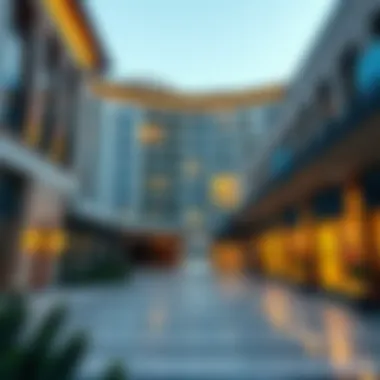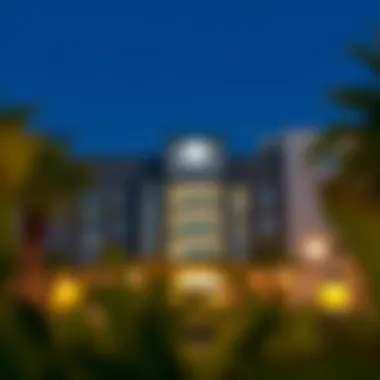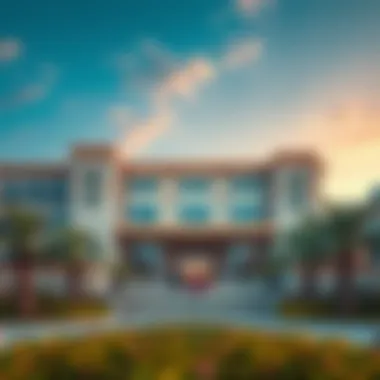Top Educational Institutions in Dubai: A Comprehensive Guide


Intro
Dubai has rapidly transformed into a global hub of education, attracting families from all corners of the world. The landscape of premier educational institutions is vastly diverse, ranging from international curriculums to innovative teaching methodologies. As parents and students navigate through these options, understanding the keys to choosing the right school becomes imperative. This article delves deep into the elite schools in Dubai, examining their academic standards, curricula, facilities, and community involvement.
Reading through, families will gain a comprehensive view that aids in making informed decisions for their children's education. Each school offers unique strengths and opportunities making it essential to weigh them based on your family's values and aspirations. By analyzing both traditional and modern facilities, this exploration ensures readers have a clear picture of what to expect regarding education in Dubai.
Property Market Analysis
The relationship between education quality and the property market is a compelling one. Families often consider proximity to elite educational institutions when deciding where to buy or rent. Thus, understanding the property market becomes crucial for future investment and living arrangements.
Current Market Trends
Currently, the Dubai property market has seen a surge in demand, correlating directly with the influx of expatriates relocating for educational prospects. The trend has highlighted areas around top schools, leading to increased interest in neighborhoods that host elite institutions. Such trends can be tracked on sites like Dubai Land Department and other local real estate platforms.
Price Fluctuations and Insights
Looking closely at the figures, one can observe that school zones often display stable prices despite fluctuations in the general market. Properties near schools like The American School of Dubai and Dubai International Academy are typically resilient to downturns.
- Key reasons for price stability:
- High demand for quality schools
- Limited housing supply in prime areas
- Families willing to pay a premium for educational convenience
As the demand for housing near reputable educational institutions continues to rise, it proves beneficial for investors to target these areas for property acquisition.
Investment Opportunities
The intersection of educational institutions and the real estate market opens numerous investment opportunities for buyers and developers. Identifying key areas that are poised for growth can yield significant returns.
Key Areas for Property Investment
Certain neighborhoods in Dubai have become focal points of interest due to their proximity to celebrated schools.
- Dubai Marina - Features several schools and has seen significant real estate development.
- Jumeirah - Known for its prestigious schools and attractive waterfront properties.
- Arabian Ranches - Offers a family-friendly environment with direct access to schools.
Tips for First-Time Investors
Entering the Dubai real estate market can be daunting but incredibly rewarding. Here are some strategies:
- Understand the market: Research neighborhoods that offer solid educational options.
- Seek expert advice: Engage with local real estate agents who understand the nuances of buying near schools.
- Plan for long-term: Invest in properties that will appeal to families, ensuring consistent demand.
With the educational landscape evolving in Dubai, so too do the property opportunities surrounding it. For families and investors, understanding these trends can translate into smart choices and a secure investment going forward.
Overview of Education in Dubai
Education in Dubai has morphed significantly over the past few decades. This transformation is a reflection of the city's rapid growth, bringing together diverse cultures and increasing demands for a quality education system. In this section, we’ll dive into the historical context, current trends, and governmental oversight shaping today’s educational landscape. Understanding these factors is crucial not just for families seeking schools for their children but also for investors and stakeholders interested in the educational domain.
Historical Context
In the not-so-distant past, education in Dubai was a straightforward affair, mainly governed by traditional methods. The city recognized the urgency to modernize its educational framework to meet the growing needs of its populace. The establishment of the Ministry of Education in the late 1970s marked a new beginning. Since then, various key developments have occurred:
- Introduction of Curricula: The introduction of various curricula, such as British and American systems, addressed the diverse background of its residents.
- Investment in Infrastructure: Investment surged in educational infrastructure, reflected by the emergence of state-of-the-art schools and colleges.
- Focus on Higher Education: The emphasis shifted towards not just primary and secondary education, but also higher education, with several universities setting their roots.
These changes laid the bricks for what is now a vibrant educational environment that attracts families from around the world.
Current Educational Trends
The contemporary educational scene in Dubai is defined by several notable trends that cater to a cosmopolitan demographic:
- International Baccalaureate (IB): There’s a growing inclination towards schools offering the IB curriculum, appealing to families desiring a global perspective.
- Technological Integration: Classrooms are increasingly equipped with tech tools facilitating interactive learning. For instance, many schools have adopted programs like Google Classroom or platforms that blend traditional learning with digital experiences.
- Emphasis on Soft Skills: Balancing academic achievement with character building is gaining traction. Programs for leadership, ethics, and social responsibility are integrated into reputable institutions.
- Parental Involvement: Parents are becoming more involved in the educational journey, pushing schools to maintain high standards and to adapt to their feedback.
These trends illustrate a robust effort to not only educate but also prepare students for a complex global landscape.
Government Regulations and Policies
The educational policies set by the Dubai government create a framework to ensure consistent quality across schools. The Knowledge and Human Development Authority (KHDA) plays a pivotal role in overseeing and regulating educational institutions. Key regulations included:


- School Inspections: Regular inspections assess the performance and quality of schools, helping parents make informed decisions.
- Curriculum Standards: Schools are required to follow specific curriculum standards according to approved guidelines, ensuring they align with the national interests.
- Incentives for Private Schools: To encourage high standards, there are incentives for private institutions that achieve outstanding results in external assessments.
The government’s active role guarantees that educational institutions remain accountable and continually strive for improvement.
By looking at the historical roots, current trends, and regulatory framework, we gain a comprehensive understanding of Dubai's educational landscape. This knowledge sets the stage for exploring further into specific schools, their profiles, and what makes them stand out in this competitive environment.
Criteria for Assessing Top Schools
When it comes to choosing a school in Dubai, parents often find themselves navigating through a myriad of options. The educational landscape is crowded and diverse, making it crucial to have a clear set of criteria for assessing the top schools. Understanding these criteria not only aids in evaluating the quality of education but also ensures that students receive the enriching experience they deserve. Key factors often include academic performance metrics, extracurricular activities, and community involvement—all critical elements that shape a student's overall development.
Academic Performance Metrics
Academic performance metrics provide a quantifiable way to gauge the effectiveness of a school's educational offerings. Standardized test scores, graduation rates, and university admission statistics are often the most visible indicators. However, it's not just about the numbers. Parents should look deeper into how these metrics reflect the school's teaching methodologies and curriculum rigor.
For instance, if a school consistently boasts high scores in international assessments, it may suggest a well-structured curriculum aligned with global standards. Yet, one should also inquire about how schools support students who may struggle academically. A balanced approach, one that encourages learning for all students, illustrates a school's commitment to not only high achievers but also to nurturing those who need extra support.
Extracurricular Activities
Extracurricular activities play a vital role in holistic education. They offer students the chance to explore interests beyond the classroom, fostering not only skills but also creativity and teamwork. Schools with a wide array of options—be it sports, arts, or clubs—often contribute to a more rounded development for students.
Consider a school that has partnerships with local organizations or professional teams to provide real-world experiences. Participating in a community theater or competing in local sports leagues can offer students invaluable life skills. Moreover, these activities can offer pathways to build friendships and networks, all of which are key to personal growth during formative years.
- Music Programs
- Debate Clubs
- Robotics Teams
These might be just some avenues students can explore beyond their academic endeavors, each enhancing their educational journey.
Community Involvement and Engagement
Community involvement is another essential aspect that should not be overlooked. Schools that actively engage with their communities foster a sense of responsibility and connection among their students. This could range from participating in local charity events to fostering partnerships with local businesses for internships or volunteering opportunities.
Engaged schools often encourage students to gain a sense of global citizenship by involving them in social issues and community improvements. In Dubai, where cultural diversity is abundant, schools that emphasize community service expose students to a variety of perspectives.
"Schools which instill a sense of community in students help them grow into responsible and conscientious adults."
Investing time in understanding how a school fosters community engagement can provide a lens into their values. Schools that prioritize family events and collaborations with local organizations demonstrate an investment in their students’ development not just academically, but socially as well.
List of Prominent International Schools
Having a clear line-up of prominent international schools in Dubai is pivotal for families navigating the complex educational landscape. With diverse curricula that cater to varied pedagogical philosophies, understanding these schools can help investors, buyers, and real estate professionals alike. The presence of esteemed educational institutions not only enhances property appeal but also ensures a robust potential for future developments. Families want the best for their children, and education is a cornerstone in that choice. Thus, identifying these schools can elevate the quality of the community around them.
British Curriculum Schools
British curriculum schools in Dubai carry a certain gravitas. Known for their structured approach and exam-focused methods, schools like Dubai British School and Repton School shape students with a rigorous education system while weaving in rich cultural experiences. These institutions often exhibit strong ties to UK education standards, which play out in the form of GCSE and A-level qualifications.
Key Benefits of British Curriculum Schools:
- Rigorous Assessment: Students are assessed through a well-defined grading system that prepares them for higher education requirements.
- Cultural Connections: Being a former British colony, many families find comfort and familiarity within these settings.
- Extracurricular Focus: Schools usually promote a balanced education, encouraging students to participate in sports, arts, and community services.
The appeal of the British model doesn’t end with its syllabus. The teaching staff, extensively trained and often British-qualified, fosters an environment of excellence that resonates with parents seeking premier schooling options for their kids.
American Curriculum Schools
American curriculum schools present an attractive option for many expatriate families, rooted in the flexibility and comprehensive nature of their educational philosophy. Institutions like GEMS American Academy and American School of Dubai offer a curriculum that emphasizes creative thinking and critical analysis.
Considerations for American Curriculum Schools:
- Diversity of Programs: The American system typically includes Advanced Placement (AP) classes that give students a jumpstart into college-level coursework.
- Holistic Development: The focus isn't just on academics; schools provide pathways for personal growth through extracurricular activities.
- Familiar Environment: Many students, particularly those from North America, find a comforting alignment with their educational norms, making transitions smoother.
The environment in American schools often mirrors the cultural values of open-mindedness and innovation, fostering a diverse student body that thrives in collaboration.
IB Curriculum Schools
The International Baccalaureate (IB) curriculum commands respect around the globe, and Dubai is no exception. Schools like Dubai International Academy and GEMS Modern Academy uphold the IB philosophy of creating inquiring, knowledgeable, and caring young individuals. This curriculum is rigorous, holistic, and aimed at developing well-rounded students who are prepared for global citizenship.
Important Aspects of IB Schools:
- Global Perspective: The IB curriculum promotes an understanding of international issues, preparing students to thrive in an interconnected world.
- Emphasis on Research and Writing: With an extended essay component, students engage in in-depth research, enhancing their analytical skills.
- Community Action Projects: Participation in community service programs encourages students to become active and compassionate citizens.


Being part of an IB school signifies commitment—not just to academic excellence, but to a mission of fostering a sustainable future.
In summary, understanding the landscape of prominent international schools in Dubai can provide parents, investors, and real estate agents crucial insights. Each curriculum, from British to American to IB, offers distinct advantages that can significantly impact educational choices. This knowledge enriches conversations surrounding real estate investments, ensuring they are grounded in community-oriented priorities.
In-Depth Profiles of Top Schools
Understanding the profiles of leading educational institutions in Dubai is crucial for several reasons. First off, these detailed examinations offer parents a glimpse into what makes each school unique, beyond simply rankings or reputations. Each school boasts specific characteristics that cater to different needs of students, and identifying these can greatly assist families in making informed choices about their children’s education. Moreover, a thorough exploration provides insights into how these schools align with the current educational trends and standards discussed earlier in this article.
School A Overview
Academic Programs
The academic programs at School A offer a blend of both traditional and contemporary methods of learning. One standout feature is the incorporation of project-based learning, which has shown to foster critical thinking skills. Unlike rote memorization, this approach engages students in solving real-world problems, making their learning more applicable and relatable. Parents often find this method appealing, as it aligns well with the demand for skills like creativity and innovation in the workforce.
In addition to core subjects, School A also emphasizes STEAM (Science, Technology, Engineering, Arts, and Mathematics), which is becoming increasingly pivotal as the world evolves. This program equips students not only with technical know-how but also cultivates artistic and analytical thinking.
Facilities and Resources
Facilities at School A are designed to create an enriching atmosphere conducive to learning. The school features state-of-the-art laboratories, a robust library filled with resources, and ample sports facilities that encourage physical education. The importance of having modern facilities cannot be overstated, as they significantly enhance the educational experience, allowing students to engage in hands-on learning.
However, a notable disadvantage could be the maintenance of these high-end facilities, which requires substantial financial resources – this could lead to higher tuition fees.
Achievements and Recognition
School A has garnered numerous accolades throughout its years of operation. Its commitment to academic excellence is evidenced by outstanding performance in regional competitions and recognized accreditation from educational authorities. This recognition reassures parents that the institution meets high standards of education.
Yet, reputation can be a double-edged sword; parents sometimes feel pressured to enroll their child to maintain a certain status, regardless of their child's unique needs.
School B Overview
Academic Programs
School B adopts a more holistic approach towards academic programming. It balances academic rigor with emotional and social learning, preparing students not only for exams but for life beyond school walls. The inquiry-based learning model allows students to explore subjects through questioning and research, leading to a deeper understanding of their education.
One could argue that this methodology encourages a love for learning rather than just knowledge acquisition. Still, it might be seen as less structured, which can be concerning for parents preferring a more traditional approach.
Facilities and Resources
The facilities at School B include expansive outdoor areas, fostering an environment where students can learn and play in nature. This connection with the outdoors is not just about relaxation, but about utilizing natural settings for learning, which many educators advocate for today.
However, a constraint here might be the limited number of technological resources compared to other institutions. Parents looking for cutting-edge tech in classrooms might consider this a significant drawback.
Achievements and Recognition
School B has made headlines with its various community service initiatives, receiving recognition not only for academic achievements but also for instilling values of social responsibility in students. This dual focus is attractive to many parents who value character development alongside academic prowess. While community engagement is praiseworthy, it may take time away from academics, which is always a balancing act schools have to manage.
School Overview
Academic Programs
School C stands out with its focus on international baccalaureate programs, preparing students for a globalized world. The curriculum emphasizes critical thinking, intercultural understanding, and develops personal skills essential for future success. By fostering an environment of inquiry, students are encouraged to challenge assumptions and delve deeper into subjects.
However, it’s essential to consider if the intensity of the IB program is suitable for every student. The rigorous nature might not align with all learning styles, which could sometimes lead to frustration for certain students.
Facilities and Resources
This school is also equipped with dedicated spaces for art and music, recognizing the importance of creative education. The presence of these resources significantly enhances student engagement and allows expression of individual talents. That said, the facilities are sprawling, which could pose security and supervision challenges.
Achievements and Recognition
School C has earned a stellar reputation due to its high graduation rate and the number of students pursuing higher education at prestigious institutions worldwide. The accolades earned reinforce its position in the educational landscape. Yet, this reputation can also create high stakes and commitments for students, leading to undue stress.
Overall, these profiles offer a comprehensive insight into the unique offerings and character of each school, essential for discerning families navigating the education landscape in Dubai.
"Choosing the right school is much like selecting a home; it’s about finding the right fit that caters to your family’s needs and values."


These insights help pare down choices, focusing on what individual institutions bring to the table in terms of nurturing future-ready individuals.
Cultural Considerations in Education
Understanding the cultural considerations in education is crucial, especially in a diverse metropolis like Dubai. With a melting pot of nationalities and cultures, the educational institutions must reflect this unique environment. The benefits of addressing cultural elements in education are manifold; they pave the way for inclusivity, fostering an environment where every child feels recognized and valued. Moreover, by integrating cultural awareness, schools can build better bridges among different communities, which is essential in a city characterized by its multicultural landscape.
Diversity and Inclusion
Diversity and inclusion are at the heart of educational success in Dubai. Schools that actively promote these principles provide an enriching experience for students from all walks of life. When children learn in a diverse setting, they develop empathy and a broader worldview, essential traits for the global society in which they will reside.
Here are some ways schools in Dubai implement diversity and inclusion effectively:
- Multilingual Programs: Offering instruction in multiple languages helps students from various backgrounds to engage and excel.
- Cultural Celebrations: Schools often organize events that celebrate different cultures, promoting respect and appreciation among students.
- Inclusive Policies: Establishing policies that accommodate students with diverse needs ensures everyone has the opportunity to thrive.
"Education is about opening doors to understanding, not just imparting knowledge."
Religious Sensitivity in Education
In a region where both Islamic traditions and Western educational practices coexist, religious sensitivity becomes a vital consideration in the curriculum. Schools in Dubai must navigate this complexity thoughtfully.
- Respect for Traditions: Institutions are expected to recognize Islamic holidays and incorporate Islamic values into their teaching. This doesn't just cater to Muslim students, but educates all students about the predominant culture of the region.
- Balanced Curriculum: The educational framework often includes a blend of religious and secular studies, ensuring that students appreciate their heritage while also learning critical thinking skills.
- Prayer Facilities: Many schools provide prayer rooms for Muslim students, an essential aspect fostering spiritual growth and reflecting the institution’s commitment to inclusivity.
In essence, addressing cultural considerations in education is not merely a policy requirement; it’s a fundamental need in Dubai's diverse educational landscape. Schools that prioritize these factors will stand out, appealing to discerning families seeking holistic educational environments for their children.
Future of Education in Dubai
The future of education in Dubai is a vital topic, as it showcases the evolution of the educational landscape and how it adapts to a rapidly changing world. As families from diverse backgrounds flock to this city for opportunities, the need for a robust educational framework becomes paramount. The emphasis on innovative teaching practices, the integration of technology, and a focus on nurturing global citizens will shape the direction of schools in the region.
Innovative Teaching Practices
In recent years, educators in Dubai have started to move away from the traditional rote-learning methods. They are increasingly embracing learner-centered approaches. Instead of sticking to textbooks alone, many schools are implementing project-based learning, where students engage with real-world problems. For instance, at the American School of Dubai, students are encouraged to collaborate and devise solutions for local issues, allowing knowledge to transcend classroom walls.
Furthermore, schools are utilizing interdisciplinary teaching methods. One such example is the merging of art and science curricula in schools like Jumeirah English Speaking School. This approach not only cultivates creativity but also enhances critical thinking skills among students.
Impact of Technology
Technology has become a cornerstone in Dubai's educational transformation. The UAE government has invested heavily in advanced educational technologies, making it a focal point for schools. For instance, smart classrooms equipped with interactive whiteboards and tablets have emerged as norms in many premier institutions.
One of the most notable advancements is the introduction of personalized learning platforms such as OSMO and Google Classroom. These tools allow educators to tailor lessons according to each student's learning pace and style, thus fostering an individualized learning experience.
"With technology in education, we’re not just teaching the future; we’re building the future."
Moreover, coding and robotics are now integral to many school curricula, preparing students for careers that are still evolving. The Al Mawakeb School has launched a robotics club, allowing students to participate in competitions, fostering teamwork and problem-solving skills.
Preparing Students for Global Citizenship
As the world becomes increasingly interconnected, schools in Dubai recognize the need to cultivate a sense of global citizenship among their students. This is evident in their curricula that include international-mindedness. Schools like the Dubai International Academy are pioneering initiatives that encourage students to understand and respect diverse cultures through exchange programs and community service.
Moreover, global citizenship education empowers students with the skills to navigate international environments. They learn critical thinking, empathy, and communication, essential in today's multicultural societies. The school's Model United Nations program provides a platform where students can debate and collaborate on global issues, preparing them to be active citizens in today's world.
Epilogue
The selection of an educational institution can have long-lasting implications for children, shaping not only their academic journey but also their personal development. As discussed throughout this article, understanding the nuances of each school’s offering—from its curriculum to extracurricular activities—is crucial for informed decision-making.
Reiterating the Importance of School Selection
Choosing a school is akin to selecting the right foundation for a house. Parents should consider how each institution aligns with their child’s learning style, interests, and aspirations. The right fit can foster a supportive environment where students thrive, while a mismatched choice can stifle potential.
When assessing schools, parents must take into account specific elements:
- Curriculum Fit: Not all curricula resonate with every student. Some may thrive under the British system, while others find the American or IB programs more conducive to their learning.
- Teaching Philosophy: Each school has its own teaching approach. Understanding whether a school focuses on rote learning or experiential education can guide parents.
- Extracurricular Opportunities: Beyond academics, engaging in sports, arts, or community service can nurture essential life skills. Choices in this area can have considerable impact.
In the cosmopolitan environment of Dubai, it is also vital to recognize the diversity in the student body. Schools that prioritize inclusivity can create enriching experiences by promoting cultural exchange and understanding. Parents should consider how well a school fosters this aspect, as it can play a pivotal role in a child's social development.
Final Thoughts on Dubai's Education Landscape
Dubai's education sector is evolving rapidly, reflecting broader global trends while catering to its unique demographic landscape. The city is home to a myriad of educational institutions, each boasting distinct characteristics and strengths. Parents exploring Dubai’s offerings must remain well-informed to navigate this intricate educational landscape.
Key takeaways include:
- Research Thoroughly: Dive into the available resources to understand what institutions offer. Online platforms and school reviews provide relevant insights.
- Visit Schools: Nothing beats a firsthand experience. Engaging with educators and examining facilities can solidify opinions about a school’s environment.
- Align Goals with Choices: Understanding personal educational goals will steer families towards the institutions that can best support their vision for their child's future.
Finally, as Dubai continues to flourish as an educational hub, families should recognize the opportunities available and make the most prudent choices for their children. By thoughtfully considering all aspects discussed here, one can ensure that school selection is a step towards a brighter, more promising future.











